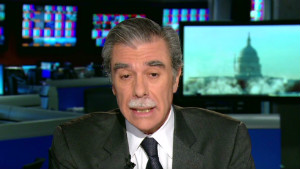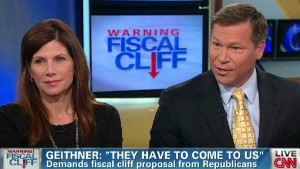Washington (CNN) -- Negotiations on a deal to avoid the fiscal cliff got a jump-start on Monday with House Republicans offering a counter-proposal to President Barack Obama, but continuing to reject his call for higher tax rates on the wealthy.
The GOP proposal would result in $2.2 trillion in deficit savings over the next decade, including $800 billion from tax reform, $600 billion from Medicare reforms and other health savings, and $600 billion in other spending cuts, House GOP leadership aides told reporters.
House Speaker John Boehner called it a "credible plan that deserves serious consideration by the White House."
House GOP offers fiscal cliff counterproposal
 CEOs talk fiscal cliff
CEOs talk fiscal cliff  Fiscal cliff worries defense contractors
Fiscal cliff worries defense contractors  Carlos Gutierrez on fiscal cliff
Carlos Gutierrez on fiscal cliff  Mack: Neither side has credible plan
Mack: Neither side has credible plan The move followed a weekend of accusations by both sides that the other was not serious about reaching a deal to avoid the automatic tax hikes and spending cuts scheduled to take effect January 1 -- what is known as the fiscal cliff that economists say will damage U.S. growth.
An initial White House response to the offer, which was contained in a letter from GOP House leaders, said the proposal would increase the tax burden on the middle class while lowering rates for the wealthy.
"Until the Republicans in Congress are willing to get serious about asking the wealthiest to pay slightly higher tax rates, we won't be able to achieve a significant, balanced approach to reduce our deficit," said the statement by White House Communications Director Dan Pfeiffer.
Earlier, White House spokesman Jay Carney made clear that Obama would reject any proposal that extended tax cuts from the Bush administration to the wealthiest Americans.
"He will not sign a bill that extends those tax rates for the top 2%," Carney told reporters. "We can't afford it. It is not a wise economic policy. It's not wise fiscal policy and it would defeat the principle of balance that he has embraced so clearly throughout these negotiations."
A Senate Democratic leadership aide told CNN on condition of not being identified that Republicans must first agree to increased tax rates on the wealthy, saying "don't look for any concessions from the White House until the GOP pulls the Band-Aid off on rates."
The Republican move came as pressure increased for Boehner to hold a vote in the House on a Senate measure that would extend the Bush-era tax cuts for income up to $250,000 for families while allowing rates to return to higher levels of the 1990s on the rest.
Fresh off his re-election victory, Obama demands House passage of the Senate measure, which he says would avoid a fiscal cliff tax hike for 98% of Americans.
Opinion: A tax we could learn to love
A central theme of Obama's first term and re-election campaign, the plan would increase revenue by almost $1 trillion over 10 years, providing a significant portion of the $4 trillion in overall deficit reduction sought by both sides.
However, Republicans led by Boehner object to any increase in tax rates, even for higher levels of income earned by 2% of Americans.
Instead, the counter-offer Monday proposed $800 billion in deficit savings through tax reform, including raising an unspecified amount of revenue by eliminating tax deductions and loopholes.
The GOP letter noted that the new offer was based on a framework proposed last year by Erskine Bowles, a Democrat and one-time White House chief of staff who co-chaired a deficit reduction commission appointed by Obama in 2010.
"This is by no means an adequate long-term solution, as resolving our long-term fiscal crisis will require fundamental entitlement reform," the letter said. "Indeed, the Bowles plan is exactly the kind of imperfect, but fair middle ground that allows us to avert the fiscal cliff without hurting our economy and destroying jobs. We believe it warrants immediate consideration."
Pfeiffer's response, however, said the GOP plan "includes nothing new and provides no details on which deductions they would eliminate, which loopholes they will close or which Medicare savings they would achieve."
"Independent analysts who have looked at plans like this one have concluded that middle class taxes will have to go up to pay for lower rates for millionaires and billionaires," his statement said.
Bowles later denied any direct connection to the GOP proposal, saying it reflected his view of a middle-ground approach a year ago but that "circumstances have changed since then."
"It is up to negotiators to figure out where the middle ground is today," Bowles said in a statement. "Every offer put forward brings us closer to a deal, but to reach an agreement, it will be necessary for both sides to move beyond their opening positions and reach agreement on a comprehensive plan which avoids the fiscal cliff and puts the debt on a clear downward path relative to the economy."
The tax fight continues to stymie congressional negotiations on reducing chronic federal deficits and debt. This time, the public brinksmanship comes with a looming year-end deadline for the fiscal cliff.
Without a deal, taxes for everyone go up on January 1 when the Bush tax cuts are set to expire.
"Nobody wants to raise taxes on the middle class, and there the president's got a lot of leverage," noted CNN Chief Political Analyst Gloria Borger.
For the GOP, an agreement must include major reforms of entitlement programs such as the Medicare and Medicaid government-run health care programs for senior citizens, the disabled and the poor.
On Sunday, House Democratic leader Nancy Pelosi threatened a procedural move that would, at the least, require Republicans to publicly state their opposition to avoiding the fiscal cliff tax hike on everyone.
"If Speaker Boehner refuses to schedule this widely-supported bill for a vote, Democrats will introduce a discharge petition to automatically bring to the floor the Senate-passed middle class tax cuts," Pelosi said in a statement. "We must find a bold, balanced and fair agreement to avoid the fiscal cliff. The clock is ticking and stalemates are a luxury we cannot afford."
GOP, break Grover Norquist's grip on you
Under a "discharge petition," a bill can be brought to the floor without going through a committee or without approval of House leadership. The bill would need majority support -- or 218 votes -- to pass.
In the current lame-duck session of Congress, there are 192 Democrats in the House, so at least 26 Republicans would have to defect for Pelosi's motion to succeed.
Some House Republicans, including Rep. Tom Cole of Oklahoma and other conservative voices, have called for passing the tax plan sought by Obama and Democrats to allow the broader negotiations to move forward.
Cole and fellow conservative Rep. Tim Scott both said last week they believed that Senate tax measure would pass if brought to a vote in the House.
However, Cole made clear he would follow the directions of the leadership, tamping down the chances of a GOP revolt against Boehner over the issue.
Boehner has so far rejected any increase in tax rates, even if only for the wealthiest Americans, saying his offer to include additional revenue by eliminating some loopholes and deductions was a major concession.
On Sunday, he described the latest Democratic proposal for a broader deficit reduction plan as one-sided and unworthy of discussion.
"The president's idea of a negotiation is, 'Roll over and do what I ask,'" Boehner told Fox News Sunday, describing himself as "flabbergasted" by the plan put forward last week by Treasury Secretary Timothy Geithner. "I looked at him and I said, 'You can't be serious.'"
Such posturing on both sides reflects the mistrust built up over two years of deficit wars that have left Congress with a reputation of dysfunction.
5 ways you would stop the fiscal cliff
Failure to reach a deal to avert the fiscal cliff and devise a framework for a broader deficit reduction package to be negotiated when the new Congress is seated in January would cause certain economic turmoil and threaten the U.S. credit rating.
The Bush tax cuts of 2001 and 2003 already were extended by two years as part of budget negotiations earlier in Obama's term.
In addition, spending cuts of $1 trillion over 10 years also kick in next year, the result of the Republican-led standoff over raising the federal debt ceiling in 2011 that led to a U.S. credit rating downgrade.
Sharp tax increases and automatic spending cuts would cut the projected federal budget deficit nearly in half -- but also would threaten millions of jobs, especially those dependent on government contracting, and risk a return to recession, according to the non-partisan Congressional Budget Office.
The non-partisan Tax Policy Center estimates middle class families would pay about $2,000 a year more in taxes without another extension of all the Bush tax cuts, as sought by Republicans.
Without a deal in the lame-duck Congress, each side wants the other to get the lion's share of public blame for higher taxes and economic uncertainty.
The plan that Geithner presented to Republicans last week called for $1.6 trillion in new taxes, including the rate hike for income over $250,000.
"There's not going to be an agreement without rates going up," Geithner told CNN in an interview aired on Sunday. "If they are going to force higher rates on virtually all Americans because they're unwilling to let tax rates go up on 2 percent of Americans, then, I mean that's the choice they're going to have to make.
Listen: WWJD...about taxes?
Obama also wants to close loopholes, limit deductions, raise the estate tax rate to 2009 levels and increase taxes on capital gains and dividend taxes.
In addition, the Obama proposal calls for a new $50 billion stimulus package, a home mortgage refinancing plan, and an extension of unemployment insurance benefits. It also would extend the payroll tax cut passed early in Obama's administration.
In return, multiple sources told CNN that Obama is offering $400 billion in new cuts to Medicare and other entitlement programs -- with specifics decided next year.
According to a CNN/ORC International Poll released last week, 56% of people said taxes should be kept high to help lower-income people, while 36% said taxes should be kept low to create jobs.
Another survey, by ABC News and the Washington Post, showed two-thirds of respondents supported Obama's call for holding down tax rates for everyone but the wealthiest Americans.
Mark Zandi, chief economist for Moody's Analytics, predicted on the CBS program "Face the Nation" that lawmakers would reach a short-term deal that would limit the economic damage, extend the U.S. debt ceiling to avoid another standoff like the one in 2011 and lay down a framework for future deficit reduction talks.
Defense companies see cuts coming even with a budget deal
{ 0 comments... read them below or add one }
Post a Comment